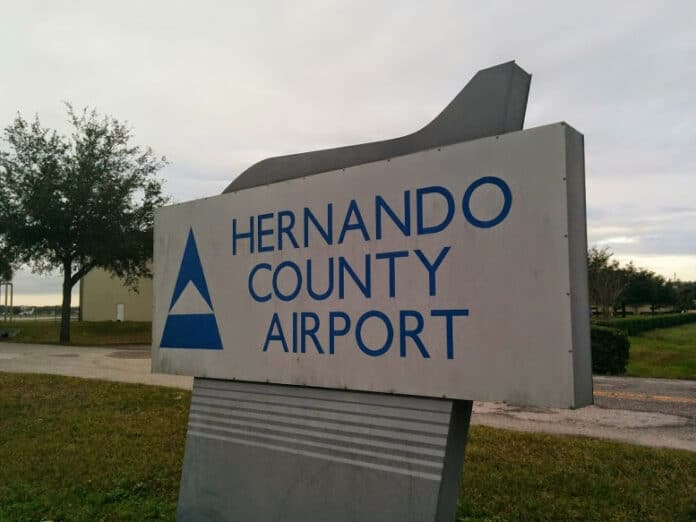by JULIE B. MAGLIO
This article corresponds to the following consent agenda item from the Jan. 29, 2019 Hernando BOCC meeting, which was pulled for discussion:
Reconsider Recommendation for Aircraft Self Fueling Facility Project at Brooksville-Tampa Bay Regional Airport
On Dec. 18, 2018, Commissioners voted 3-2 to not approve the award of Contract No. 18-CG0117/BH to GLF Construction Corporation for Aircraft Self Fueling Facility Project at Brooksville-Tampa Bay Regional Airport and Associated Budget Resolution (Cost: $1,255,770.00).
Mr. Champion and Mr. Dukes were in favor of awarding the contract at that time. On Jan. 29, 2019, the contract was brought before the board once again.
The construction project would be funded in part by an FDOT grant. According to the county, FDOT grant funds were awarded to the county for an aircraft self fueling facility “in the amount of $697,650.00 with a matching amount of $174,412.00 (aggregate amount of $872,062.00).
The Brooksville-Tampa Bay Regional Airport has expended $113,080.50 towards this project of which $89,544.40 has been received from FDOT for engineering and miscellaneous services.”
Dr. Dave Byers gave his input on the aircraft self fueling facility. He is the architect and author behind the feasibilty study for self fueling facility. Byers also wrote the airport’s business plan and was involved in construction of air traffic control tower.
Byers stated, “The fact that the airport does not have self service now- this would fill a gap in the services that you provide to all the users of the airport.”
“The first thing that jumped out at me is who else does self service fueling and why?”
He stated that there are only two airports that compete with BKV- Inverness and Zephyrhills and both offer self service fueling.
“But why would you want it, if you already have full service?” He questioned.
Byers went over financial figures. He stated that the money is in jet fuel as jets have a much larger fuel capacity- 400 gallons versus AV gas for smaller aircraft at 25 gallon capacity.
He says that a recent study determined that on average over 400 gallons of fuel is pumped into a jet aircraft. For AV gas it was around 25 gallons.
According to Byers, the FBO must provide AV gas to maintain FBO status.
Do they make money? “Probably not,” says Byer.
He explained that driving a truck across the airport to provide 20 gallons of AV gas to an aircraft is not a money maker- between the costs of facilities, truck and driver.
He stated that a self fueling facility at the airport would relieve the FBO’s burden of AV gas. He also remarked that the FBO is only open 7 to 7 whereas the self fueling facility would be 24 hours and it is all automated.
Mr. Byer presented some economic figures:
• Out of pocket cost for building self fueling facility after accounting for grant money is $7200 annually if you use a 20 year straight line depreciation.
• Plus cost for maintenance, repairs, inspections is another $9200 annually
Total net cost per year is about $16,400- that is what you have to recover.
Byer estimated that conservatively- they’d be pumping 18-20,000 gallons of AV gas per year. If they charge $3.99 per gallon, then they’d break even. He said that there could be the opportunity for profit at $4.29 per gallon.
He encouraged the board by saying that this is a rare opportunity and not many states provide similar grant programs.
Commissioner MItten stated, “My biggest concern since the beginning, when we talked about this in 2017 was the government subsidizing a service that they were requiring a private citizen- a business- to sell. As this has progressed, the idea of having an RFP to bring in some entrepreneur who thinks that they might be able to make money at this… it helps that we could help write that lease to make it attractive.”
Mitten said that the airport is a “fantastic gem of Hernando County.”
“And this would add to the infrastructure, it would add to that service- that is apparently not well administered all around the state.” He referred to the feasibility study which looked at seven airports with a total of nine FBOs- 2 of which have self service.
Mitten admitted that he’s not sure if that’s because it is a bad business or lack of opportunity to provide this unique service. “This has been offered to Hernando County and I would be friendly to a private organization through an RFP process- to make it attractive,” Mr. Mitten said.
Chairman Holcomb supports bidding the facility out to a private company with price restrictions, worrying that a private company could jack up the price to just under full service and they wouldn’t be competitive with other airports, negating the purpose of building the facility.
Commissioner Champion supports the idea of a self fueling facility and says it’s an economic driver for the airport. He stated that he wouldn’t be surprised if the amount of gas they pump doubles with the self fueling facility. He suggested looking into a flow fee.
Champion made a motion to approve “with the idea that we’d like a private company to operate it, with our legal counsel going through and making sure we draft a contract that is going to be beneficial to the private company and the airport. The whole goal here is to bring more business to the airport- that’s it.”
Dukes provided a second. The motion passed 5-0.

